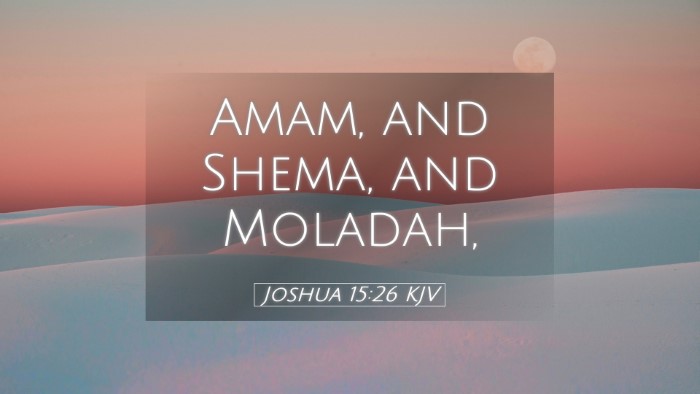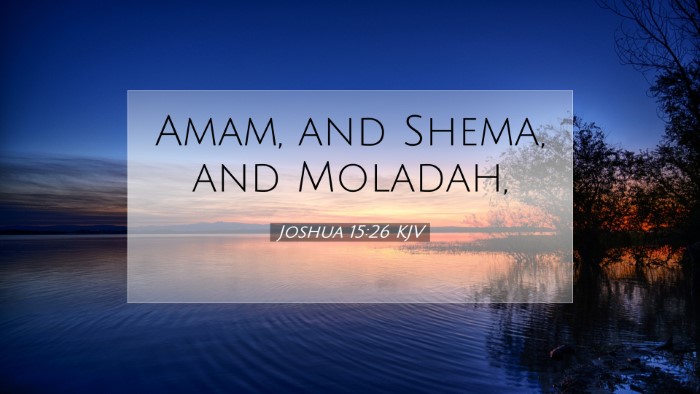Commentary on Joshua 15:26
Text of Joshua 15:26: "And Micmethah, and do not forget, it is the inheritance of Caleb ben Jephunneh in the wilderness of Judah, near the waters of Meribah." (Paraphrase for clarification)
Introduction
This verse is foundational to understanding the territorial allotment of Canaan as described in the Book of Joshua. By examining the context and significance of the locations mentioned, we gain insights into God’s faithfulness to His promises and the fulfillment of Israel’s inheritance. The territories mentioned in Joshua 15:26 reflect both geographical and theological dimensions that are crucial for a deeper comprehension of this text.
Historical Context
The chapter serves as a record of the distribution of land among the tribes of Israel post-conquest of Canaan. The selections focus on Judah, the tribe of Caleb, who was rewarded for his faith and endurance. Notably, this includes towns that might have cultural or historical importance beyond their geographical relevance.
Microfocus on Micmethah
This locality, though not extensively mentioned elsewhere in Scripture, contributes to the narrative of Israel's settlement. It marks one of the sites awarded to the tribe of Judah and emphasizes Caleb's inheritance. The less-known towns highlight the vastness of God's promised land and His provision.
Caleb's Faithfulness
Caleb ben Jephunneh represents a model of faith in God’s promises. He was among the spies who returned with a positive report about the land, demonstrating remarkable faith (Numbers 13:30). His unwavering confidence in God’s ability to deliver the land is illustrated throughout his life. The mention of his inheritance in this verse signifies God’s reward for persevering faith, encouraging believers to trust in God's promises even amidst challenges.
Theological Implications
This brief mention in Joshua encompasses profound theological themes, including:
- The Sovereignty of God: God’s orchestration in bringing the Israelites to a promised land showcases His supreme control over history and His people.
- The Fulfillment of Promises: Caleb’s inheritance is a testament to God’s faithfulness. The land promised to the Israelites symbolizes spiritual blessings for believers today.
- The Importance of Faith: Caleb is an archetype of fidelity and trust in divine promises, urging contemporary followers to exhibit similar resilience in faith.
- Covenantal Memory: The mention of specific towns reminds the Israelite community of their covenant with God and His consistent provision.
Commentary Insights
Matthew Henry
Matthew Henry notes that the land allocations reflect God's precise plans and provisions for His people. He emphasizes the importance of recognizing how each allotment serves to fulfill the divine promise made to Abraham, Isaac, and Jacob. Henry further elaborates on how locations like Micmethah may seem insignificant, but they play a role in the larger narrative of God's faithfulness to Israel.
Albert Barnes
Barnes points out that the geographical names function not only as historical markers but also as commemorations of divine intervention. He finds that Micmethah aligns historically with Israel’s journey, affirming that every inch of land is a gift from God. He also stresses the consequential transition into the Promised Land as both a literal and spiritual entry into God’s promises, applicable to both ancient and modern believers.
Adam Clarke
Clarke provides a linguistic analysis of the names and their meanings, illustrating how they encapsulate broader spiritual truths. He emphasizes the significance of place names as reminders of God’s providence, noting that even less prominent places like Micmethah carry weight in salvation history. His commentary elicits the inherent value of remembering God’s deeds and assures the reader of God’s constant presence in the mundane journeys of life.
Conclusion
Joshua 15:26 serves as a rich tapestry of faithfulness, provision, and God’s promises. The verse not only points to historical occurrences but invites believers to reflect on God's overarching plan for salvation and the fulfillment of promises throughout generations. For pastors, theologians, and students of Scripture, this passage is an encouragement to trust in God’s sovereignty and to seek a deeper understanding of how every aspect of life is intertwined with divine purpose.
In contemplating the lessons drawn from this verse and the associated commentaries, we are reminded that as God was faithful to His covenant with Israel, so too will He remain faithful to His promises to us in Christ Jesus.


